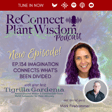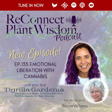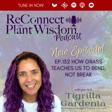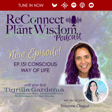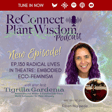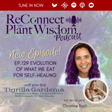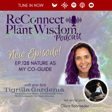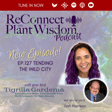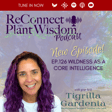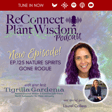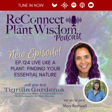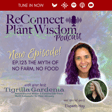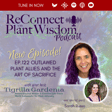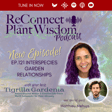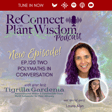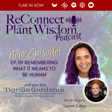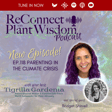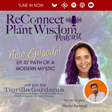
Ep.79 How Brains Limit Us with Anne Riley
In Episode 79 of ReConnect with Plant Wisdom, I welcome the brilliant Anne Riley for an insightful conversation.
With a degree in accounting and an MBA, Anne’s journey took a transformative turn influenced by Michael Rothschild's "Bionomics", sparking her to develop the theory of "idea Sphere". Through her novels and upcoming book, she explores how human and ecological systems interconnect.
Anne shares her fascinating insights on how our brains limit us and how nature-inspired thinking can unlock our true potential. We discuss how plants and animals use their bodies as tools and contrast that with human creativity in building ideas.
The episode sheds light on the ways humans can rethink their limitations and conditioning through a more natural, flow-based approach. We also emphasize the importance of adapting ancient wisdom into modern contexts and understanding the dynamic nature of ideas.
Topics Covered about brain limits
➡️ Human brain limitations vs non-brain beings
➡️ Contrast between how plants and animals use their creativity
➡️ Societal structures we’ve built compared to natural systems
Resources Mentioned
🌱 Anne's Website
🌱 Pre-order Anne's Book: The Human Idea- Earth's Newest Ecosystem
🌱 Read "Ways of Being" with us in the Plant Wisdom Book Club
🌱 Personalized mentorship with me and the Plants
🌟Connect with nature-conscious creatives, multipotentialites, and naturentrepreneursin the premier online ecosystem that nourishes plant reawakening and community support for accelerated evolution and co-creation with otherkin. >> JOIN OUR COMMUNITY <<
☝🏽ReConnect with Plant Wisdom podcast Ancient and modern knowledge from biology to spirituality about the wondrous ways plants help you lead a Naturally Conscious life. Subscribe on your favorite podcast player.
// Let's work together: book a Discovery Call
// EcoConscious Business Partners:
Get the World's Most Ecological Phone
Shop Here
// Opening and Closing music by Steve Sciulli and Poinsettia from The Singing Life of Plants
// Socialize with me Facebook | Instagram | LinkedIn | Youtube

